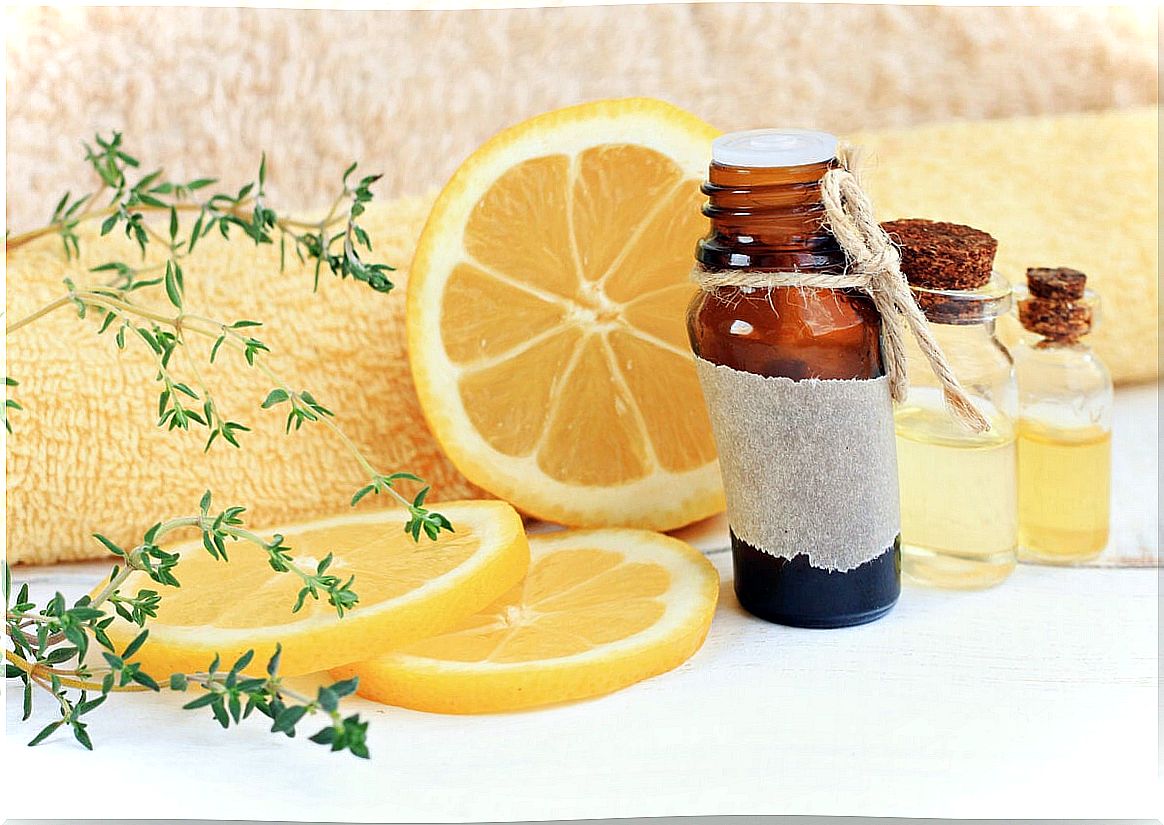Limonene: Uses, Properties And Precautions
Limonene is a natural substance whose anti-inflammatory and antioxidant properties can be of special benefit to health. We show you everything you need to know.

Limonene has long been used by people as an essential oil that is extracted from citrus fruits to treat various health problems, as a culinary item and cleaning product. This is because it is made from the peel of fruits such as lemons, limes, and oranges.
The peel of the orange represents about 97% of the essential oils of d-limonene, another way of knowing it. The preference for this product could be due to the fact that it belongs to the group of terpenic compounds, with a dense aroma that protects plants from predators.
Among its benefits, it is believed to have anti-inflammatory, antioxidant, anti-stress properties and to prevent some diseases. However, not all of your regular benefits and jobs are backed by science. Discover the properties, uses and possible precautions of limonene.
What is limonene used for?
In food it is added in drinks, sweets and desserts to grant a touch of lemon. It is also used in cosmetics, as an insect repellent and as part of cleaning products.
The process to obtain limonene is known as hydrodistillation. Citrus fruit peels are placed under fire with water until the steam does the work of condensation and separates the molecules.
The strong aroma of limonene allows it to have potential as a botanical insecticide. It is common to use it as one of the active ingredients in pesticide or insect repellent products in an ecological way.
On the other hand, it is common to find it in household products such as soap, lotions, perfumes, shampoo, air fresheners and laundry detergent. As a drug, supplements are available in capsules and in liquid form. Finally, its presentation as an aromatic oil is to take advantage of its soothing and therapeutic properties.
Health benefits of limonene
It is possible that some benefits linked to the properties of limonene are not fully supported by scientific basis. Further research is still required to understand the potential in disease prevention.
Anti-inflammatory and antioxidant properties
It is normal for the body to become inflamed as a defense mechanism against stress. However, the situation changes when it comes to chronic inflammation. This condition is capable of triggering a number of diseases including DNA damage and cancer.
In this case, it is necessary to reduce and even prevent the condition as much as possible. According to research by the Journal of Periodontology and the Journal of Oleo Science , limonene has the potential to reduce inflammation.
Likewise, a test-tube study published in the European Journal of Pharmacology showed that inflammation caused by osteoarthritis could be reduced with limonene. The same study revealed that it decreases the production of nitric oxide, a molecule that plays an important role in inflammatory pathways.
For its part, research in animals with ulcerative colitis carried out by Molecular Medicine Reports postulated that inflammation, colon damage and other various inflammations were reduced by giving limonene to the participants.
Limonene also fights free radicals in leukemic cells, thanks to its antioxidant effects that reduce cellular damage from these unstable molecules, according to test-tube research. But, despite progress on its benefits as an antioxidant and anti-inflammatory, human studies are still required.

Anti-cancer effects
Could Limonene Reduce Cancer Risk? A study published in Nutrition and Cancer found that people who consume citrus fruit peels are less likely to develop skin neoplasms than those who only eat the fruit or juice.
Similarly, a study in female breast cancer patients found that after taking 2 grams of limonene daily for a period of 2 to 6 weeks they had a 22% decrease in tumor cells.
Research in mice has also suggested that limonene supplements could prevent the growth of tumors in the skin, by preventing inflammation and oxidative stress.
For its part, research published in Experimental Biology and Medicine showed that administering limonene with drugs that fight cancers, such as doxorubicin, prevents the development of the side effects of this drug. However, more human studies are still needed and there is no possibility of considering it a first-line approach.
Improves heart health
Limonene is believed to have properties to lower the risk of heart disease by reducing elevated levels of triglycerides, cholesterol, and blood sugar. This is evidenced by a study in animals carried out with a dose of 0.27 grams per pound of body weight.
An investigation with rats that suffered cardiovascular accidents and ingested 20 milligrams of limonene resulted in a significant reduction in blood pressure, greater than those rats that only received supplements.
Limonene could have great benefits for your heart health, however, you must remember that no human studies have been done.
Other benefits of limonene
Limonene is a natural substance with a wide variety of potential benefits. Other benefits attributed to it are the following:
- Decreases appetite: according to research published in Neuroscience Letters , the aroma of this substance is capable of reducing appetite in blue flies. However, this effect has not yet been proven in humans.
- Reduces stress and anxiety: A study in rodents published in Pharmacology, Biochemistry and Behavior showed that limonene can be used in aromatherapy for its anti-stress effect.
- Improves digestion: According to animal research published in Chemico-Biological Interactions , bitter orange oil (composed of 97% limonene) prevented the appearance of peptic ulcers from the use of certain medications.
Possible side effects
The Food and Drug Administration (FDA) identifies limonene as a safe natural substance to be used as a flavoring and food additive. Simply put, it is considered suitable for human consumption and poses little risk of side effects.
In some cases, d-limonene as an essential oil can cause allergy or irritation. Therefore, according to research published in the Journal of Toxicology and Environmental Health , special care should be taken when using this presentation.
With regard to supplements, which are mostly concentrated, it is believed that they do not represent a danger when consumed because of the rapid way in which the body breaks them down. However, human studies are still required to validate such a claim.
It is not recommended to ingest limonene in high doses and its consumption should be avoided if the person is pregnant or breastfeeding. Before doing so, first consult with the doctor.

Recommended dose
Since human research is scarce, there is no recommended dose for the substance. However, studies have mostly used values of up to 2 grams per day.
For their part, the supplements offered come in amounts ranging from 250 to 1000 milligrams. In its liquid form it can be found in doses of 0.05 milligrams per serving.
Now, the supplements can be replaced by a diet rich in citrus fruits and peels, since it is not a difficult substance to absorb. Generally, it can be added in the form of zest to baked recipes and drinks, as well as consumed through concentrated lemon or orange juices.
What to remember about limonene?
Limonene is a natural substance that is extracted from the essential oil present in the peels of citrus fruits. It can be found in different presentations as supplements and oils, as well as as an ingredient in cosmetics, repellants and cleaning products.
D-limonene is also capable of providing significant health benefits. It is a source of antioxidants, reduces inflammation, prevents cardiovascular diseases, as well as reduces appetite, stress and anxiety.
We must remember that most of the research related to limonene was carried out in animals and test tubes, so more studies in humans are required and a recommended dose cannot be determined.
As for side effects, the oil could cause irritation on some skin types. Pregnant and lactating women should also avoid its use or consumption, since there is no record of its possible adverse reactions.









